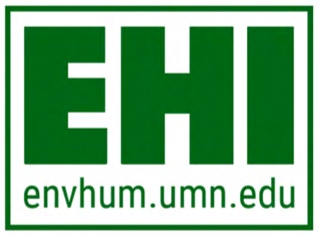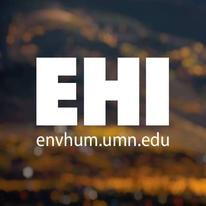Current Funding Opportunities
Fall 2023
This semester, EHI has funding available for three purposes:
Events: Grants of up to $3,000 are available for EHI-affiliated members to hold scholarly networking events, broadly defined, that advance graduate education in the environmental humanities in a transnational context. Please send a 1,000-word rationale to [email protected].
Research: Grants of up to $500 are available for EHI-affiliated graduate students to travel to conduct research or pursue creative activity and/or present the results of their research or creative activity in a public context, such as an academic conference or other public-facing event. Please send a 300-word rationale to [email protected].
Teaching: Grants of up to $500 are available for EHI members to host guest speakers in their courses, take students on field trips, and engage in other pedagogical activities. Courses must involve graduate students in some capacity: courses must be be offered at the graduate level, have graduate students actively enrolled, include a graduate student teaching assistant, or be taught by a graduate student. Please send a 300-word rationale to [email protected].
All grants are awarded three times a year; the first-round deadline is October 16, 2023.
People, Fire and Pines: A Boundary Waters storymap
August 2022
We invite you to read former EHI RA Clare Boerigter (MFA 2021)’s storymap, “People, Fire and Pines: How Fire Use by the Anishinaabeg Shaped the Boundary Waters.”
In this multimedia piece, Clare explores the false-yet-still-dominant narrative of the Boundary Waters as a wilderness “untrammeled by man,” drawing on the work and knowledge of a range of Ojibwe and non-Ojibwe experts to understand the influence of the Anishinaabeg on the forests of the Boundary Waters. Clare investigates the questions: Are there ways to live with fire, instead of suppressing it? In what ways, by attempting to live without fire, have we harmfully impacted both land and people? And what can the Boundary Waters – a wilderness frequently defined as free of human influence – teach us about the relationships between people and fire?
EHI Deadlines for IDF Applications
October 2022
The Environmental Humanities Initiative is recognized as a University Interdisciplinary Doctoral Fellowship (IDF) host organization and can offer matching support in the amount of $2,500 for one graduate student who receives an IDF award for the 2023-24 academic year. This is in addition to the IDF stipend of $25,000 for the academic year (September-May), tuition for up to 14 graduate credits each semester (Fall & Spring), and subsidized health insurance through the Graduate Assistant Health Plan. Full details about the IDF application process are available on the Graduate School website, but the key deadlines for students wishing to study with EHI-affiliated faculty are as follows:
- October 17: Application materials due to (1) Dan Philippon <[email protected]>, EHI co-organizer and academic year lead, and (2) nominee's proposed EHI faculty mentor(s), to be considered for letters of endorsement
- October 24: EHI target for co-organizers, faculty advisory board, and faculty mentor(s) to make decisions about which student EHI would be willing to host
- October 31: EHI target to provide letters of endorsement from (1) co-organizers and (2) faculty mentor(s) to nominee's graduate program (deadline dependent on the internal deadline set by each nominee's graduate program)
- November 11, at noon: Deadline for graduate programs to submit nominations to the Graduate School
An EHI-nominated student who does not receive an IDF award for 2023-24 will still be considered for EHI funding support and designation as an EHI Graduate Fellow for the 2023-24 academic year.
"The Animal": Tony C. Brown's First-Year Seminar Prompts Students To Think Critically About Their Relationship With Animals
May 2022
Tony C. Brown, an EHI faculty affiliate from the College of Liberal Arts, drives students to think morally and ethically about their complicated relationship with animals in a thought-provoking and experiential first-year seminar, The Animal, a course in the Department of Cultural Studies and Comparative Literature. Learn more about the seminar here.
Marek Oziewicz launches the Center for Climate Literacy
April 2022
Marek Oziewicz, an EHI faculty affiliate from the College of Education and Human Development, has launched the Center for Climate Literacy, a research-outreach hub whose mission is to promote universal climate literacy through research, outreach, and design solutions in K-12 classrooms. The first of its kind in the U.S., the Center focuses on strategies to help young people develop understanding, values and attitudes aligned with how we should live to respect our planetary home.
Current and future initiatives include an open-access narrative media resource hub; an open-access journal for teachers featuring educational materials hosted by the University of Minnesota Libraries; and Climate Panels, workshops, and trainings.
To find out more about the project, read the official news release and visit the Center’s website.
Maji ya Chai Land Sanctuary: A Liberal Arts Engagement Hub Residency
February 2022
Founded in 2020 by Rebeka Ndosi, Maji ya Chai Land Sanctuary is a Black-led, nature-based healing retreat created to provide rest, reconnection, and rejuvenation of mind, body & soul for Black, Indigenous and communities of color across generations. In partnership with EHI, Maji ya Chai is one of three Hub Residencies during the 2021-2022 academic year.
While the COVID-19 pandemic has posed significant challenges to in-person gathering, the organization plans to use the Hub space for community-engaged design and planning leading up to the initiation of the sanctuary. Once open, the sanctuary will be home to a retreat house, organic garden, and healing and practice center.
For more information on the Maji ya Chai Land Sanctuary and the Hub Residency, visit the CLA website.
Second Round of Funding Available for EHI Grants
December 2021
- Funds are available for EHI scholarly networking events. A maximum of $3,000 is available. Grants are awarded three times a year; the second round deadline is December 20, 2021. Please provide a 1,000-word rationale and send to [email protected].
- Funds are available for EHI members to invite guest speakers to their classes. Grants of $300-500 will be awarded. Grants are awarded three times a year; the second round deadline is December 20, 2021. Please provide a 300-word rationale and send to [email protected].
Charlotte Melin Receives ADFL Award
November 2021
We are overjoyed to announce that the Executive Committee of the Association of Departments of Foreign Languages (ADFL) has awarded the twenty-sixth ADFL Award for Distinguished Service to the Profession to Charlotte Melin, professor emerita of the University of Minnesota, Twin Cities. The award will be presented on 8 January 2022, during the annual convention of the Modern Language Association (MLA), to be held in Washington, D.C. Since 1994, the ADFL Award for Distinguished Service to the Profession has recognized eminent scholar-teachers who serve the profession in the larger community.
If you are a regular reader of this newsletter, you know that Prof. Melin is of one of the co-organizers of the Environmental Humanities Initiative, and the ADFL Award only begins to acknowledge her many contributions to our efforts to create a curricular and programmatic presence for the environmental humanities at the University of Minnesota. Although Prof. Melin officially retired in spring 2021, she has graciously agreed to continue to advise EHI, and we look forward to receiving her ongoing guidance and support as she transitions into this new phase of her distinguished career. Thank you for all you have done for EHI, Charlotte, and congratulations on receiving this well-deserved honor!
Upcoming EHI Funding Opportunities
Fall 2021
- Funding is available for EHI members to invite guest speakers to their classes. Grants of $300-500 will be awarded. Grants are awarded three times a year with an initial deadline of October 15, 2021. Please provide 300 word rationale and send to [email protected].
- Funds are available for EHI scholarly networking events. A maximum of $3,000 is available. Grants are awarded three times a year with an initial deadline of October 15, 2021. Please provide 1000 word rationale and send to [email protected].
- Funding is available for Graduate Student EHI Fellowships and Sponsorships for Interdisciplinary Doctoral Fellowship Applications.
- The Environmental Humanities Initiative is recognized as a University Interdisciplinary Doctoral Fellowship (IDF) host organization and can offer matching support in the amount of $2,500 for up to two graduate students who receive an IDF award for the 2022-23 academic year. This is in addition to the IDF stipend of $25,000 for the academic year (September-May), tuition for up to 14 graduate credits each semester (Fall & Spring), and subsidized health insurance through the Graduate Assistant Health Plan. Full details about the IDF application process are available on the Graduate School website, but the key deadlines for students wishing to study with EHI-affiliated faculty are as follows:
- October 18, 2021: Application materials due to (1) Christine Marran <[email protected]>, who is the EHI co-organizer and academic year lead, and (2) nominee's proposed EHI faculty mentor(s), to be considered for letters of endorsement
- October 25, 2021: EHI co-organizers, faculty advisory board, and faculty mentor(s) to make decisions about students EHI is willing to host
- November 1, 2021: EHI to provide letters of endorsement from (1) co-organizers and (2) faculty mentor(s) to nominee's graduate program (deadline dependent on the internal deadline set by each nominee's graduate program)
- November 12, 2021, at noon: Deadline for graduate programs to submit nominations to the Graduate School
- EHI-nominated students who do not receive an IDF award for 2022-23 will still be considered for EHI funding support of up to $2500 and designation as an EHI Graduate Fellow for the 2022-23 academic year.
- The Environmental Humanities Initiative is recognized as a University Interdisciplinary Doctoral Fellowship (IDF) host organization and can offer matching support in the amount of $2,500 for up to two graduate students who receive an IDF award for the 2022-23 academic year. This is in addition to the IDF stipend of $25,000 for the academic year (September-May), tuition for up to 14 graduate credits each semester (Fall & Spring), and subsidized health insurance through the Graduate Assistant Health Plan. Full details about the IDF application process are available on the Graduate School website, but the key deadlines for students wishing to study with EHI-affiliated faculty are as follows:
Online Conference: Toward a New Way of Being with Plants (June 17-18, 2021)
March 17, 2021
This free two-day online event will explore human/plant connections, including ethics in human treatment of plants, plant sentience and communication, and opportunities for developing more respectful and reciprocal relationships between humans and plants.
The goals of this conference are to:
- inspire people to change the ways in which they think about, interact with, and utilize plants so that their actions will be more respectful toward and collaborative with plants
- advance the perspective that plants are much more complex, sentient, and intelligent than is commonly acknowledged
- provide a forum for Indigenous and other perspectives that promote more respectful ways of relating with plants
- help to connect people who are interested in working for more respectful treatment of plants
- encourage and support the development of a network seeking to increase respectful treatment of plants that will continue after the event
- inspire and encourage scholarly emphasis on plant-human relationships
Visit the conference website here or register here.
Call for Papers & Online Research Incubator Workshop - "Humanities for the Anthropocene" (July 7-9, 2021)
March 15, 2021
The extent of human environmental impact is so great that it is measurable as a geologic imprint on our planet. We are now in an entirely human-made geologic epoch, the Anthropocene. This term is not a neutral descriptor, but it points to humans as the cause of our planet’s existential ecological crisis, and it urgently calls on us to grapple with this crisis and impending catastrophe.
The goal of this research incubator workshop is to initiate collaborative work on what it means to be a humanist and to practice the Humanities in the present moment and for the future. The incubator is a framework for presenting early-stage or ongoing research and for working collaboratively on shared ideas and lines of enquiry. Our plans include: the creation of a research group; an in-person conference in 2022; and an edited volume, Humanities for the Anthropocene Handbook, with values, principles, and tools for pedagogical praxis.
We seek wide-ranging participation from all fields in the Humanities such as but not limited to:
- Art and Art History
- Literature and Cultural Studies
- Language and Pedagogy
- HistoryGender and Queer Studies
- Postcolonialism and Environmental Justice
- Folklore
- Media, Film, and Visual Culture
- Philosophy
- Medieval Studies
- Theatre and Performance
- Critical Race Theory
- Indigenous Studies
- Religion
- Music Performance and Musicology
To submit: Please send 250-word abstracts with contact information and a short bio to: Elena Pnevmonidou, University of Victoria ([email protected]) and Kristopher Imbrigotta, University of Puget Sound ([email protected]).
Deadline for submission is 31 March 2021.
As stated above, we want to stress the workshop design of this gathering: we are looking for works in progress and avenues of research in their nascent stages.
Workshop format: three days of synchronous presentations and in-depth discussions via Zoom (3 hours per day). Presentations should be no longer than 15 minutes; this will leave time for ample discussion, which is the focal point of this workshop. This workshop is open to all and will have no fees.
Announcing the new UMN Water Network
Feburary 8, 2021
Water scholarship at the University of Minnesota has a footprint as large as some of its largest Colleges, but because activities are dispersed widely across the System, effort is diluted and coordination can be difficult. To alleviate these problems, The Water Council of the University of Minnesota announces the development and release of a new set of tools to enhance interdisciplinary water scholarship (teaching, research, outreach) across the UMN System. Graduate students, Postdocs, staff, and faculty are invited to join the new UMN Water Network, which includes: network-wide communication tools, virtual, informal gatherings, targeted working groups and branding materials to increase impact. Opt in to the UMN Water Network here.
The Institute on the Environment (IonE) Call for Affilates is now open
February 8, 2021
IonE supports a robust network of researchers, educators, and leaders advancing teaching and research on environmental topics across the UMN system and beyond through their Affiliates programming. The Affiliates programs include the IonE Educators, Associates, Fellows, and Visiting Scholars. Learn more about the IonE Affiliates programs here and apply by March 31, 2021!
Call for Proposals for “Dialogues in the Environmental Humanities,” a virtual seminar series via Zoom
October 8, 2020
We invite proposals for future Dialogues in the Environmental Humanities events. Events showcasing the work of graduate students are encouraged. Funding for outside speakers is available through EHI small grants awards. Options for this series include asynchronous lectures, with follow-up discussion in the Dialogues series, invitations to community experts, performances, and other types of events are encouraged.
EHI Scholarly Networking Events
October 8, 2020
EHI offers funds for seed projects intended to widen environmental humanities collaborations on campus. Examples include, but are not limited to, research workshops, seminars, film series, conferences, and symposia. Projects for 2020-21 should reflect socially distanced practices. A maximum of $3000 is available for each round of funding awards.
How to apply:
Deadlines: Oct. 15, Dec. 1, and February 15, 2021
Funding decisions will be made by the EHI Faculty Advisory Board. In the case of off-cycle requests, applications for funding can be accepted on a rolling basis.
All awards are contingent on funding availability.
Applications: Email a one-page abstract description of the project, including budget, and statement of how the project will advance EHI networking efforts.
Eligibility: EHI faculty or graduate students in partnership with EHI faculty mentors may apply.
Submit requests to Charlotte Melin ([email protected]), EHI co-convener and academic year lead, or contact for further information.
Funding for EHI Members to Invite Guest Speakers for Classes
October 8, 2020
EHI invites requests for funds for outside speakers. We are interested in using those resources to support graduate education and create venues for discussions where Environmental Humanities scholars can play a public role. Given current constraints on in-person events, we are pleased to be able to offer small grants for in-class visitors or appearances in the EH Dialogues series:
- Small grants of up to $300-$500 for invited speakers to attend Zoom classes or other meetings. Proposals for vents open to the EHI community are particularly encouraged. Funding may be requested for undergraduate courses, if the event is open to graduate students.
How to apply:
Funding decisions will be made by the EHI Faculty Advisory Board. In the case of off-cycle events, requests for funding can be accepted on a rolling basis. All awards are contingent on funding availability.
Deadlines: Oct. 15, Dec. 1, and February 15, 2021
Applications: Email a one-page abstract description of the speaker, course context, connection to graduate education, and benefit to EHI networking efforts.
Eligibility: EHI faculty or graduate students in partnership with EHI faculty mentors may apply.
Submit requests to Charlotte Melin ([email protected]), EHI co-convener and academic year lead, or contact for further information.
Funding Available for Graduate Student EHI Fellowships, Spring 2021 and Sponsorships for Interdisciplinary Doctoral Fellowship Applications
October 8, 2020
EHI is recognized as a University Interdisciplinary Doctoral Fellowship (IDF) host organization and can offer support in the amount of $2500 for two graduate students who receive an IDF award and, contingent on available funding, other graduate student awards.
- In 2020-21, we are also able to offer a limited number of partial fellowships for the Spring semester for graduate students working on Environmental Humanities projects. Recipients will become EHI fellows for that Spring 2021 semester and contribute to EHI activities via the website (writing blog materials, creating Flipgrid videos, etc.), presenting in the EHI Dialogues series, arranging for speakers, or organizing other network activities.
- Graduate students applying for the Interdisciplinary Doctoral Fellowship (IDF) who seek sponsorship for what project through EHI must contact us prior to applying to the IDF to receive endorsement for their projects.
How to apply:
Email a one-page abstract describing your research or creative project.
Submit requests to Charlotte Melin ([email protected]), EHI co-convener and academic year lead, or contact for further information.
Funding decisions will be made by the EHI Faculty Advisory Board.
Deadline: December 1, 2020.
Call for Presentations - The Midwest Environmental Education Conference
October 8, 2020
Luther College in Decorah, Iowa, is calling for presentations for the Midwest Environmental Education Conference (July 26-29, 2021).
Exploring Community: Land, People, Water is the conference's theme:
How can we explore and re-define “community” to include all land, water, and people? What are we learning about how these systems support, enhance, and depend on each other?
How can environmental education (EE), conservation, and outdoor recreation work together to support, enhance, and create vibrant, sustainable, resilient, healthy communities for all?
Join the conversation and “explore community” by presenting at the 2021 Midwest Environmental Education Conference!
Funding Available for EHI Members to Invite Guest Speakers to Classes and Other Meetings
August 14, 2020
EHI has funds for outside speakers and seed projects. We are interested in using those resources to support graduate education and create venues for discussions in which Environmental Humanities scholars can play a role in public discourse. Given current constraints on in-person events, we are pleased to be able to offer grants of up to $300 for invited speakers to attend Zoom classes or other meetings. If you would like to apply for this funding, please contact Charlotte Melin ([email protected]), EHI co-convener and lead for the academic year, for further information. We would prefer that funded events be open to the EHI community, but we recognize that this may not be possible in every case.
EHI Welcomes New Faculty Advisory Board
August 14, 2020
To strengthen our network and help guide the funding of future projects, EHI has formed a Faculty Advisory Board. We’re pleased to share that Kale Fajardo (American Studies), Mark Pedelty (Communications Studies), and Suvadip Sinha (Asian & Middle Eastern Studies) will join founding EHI co-conveners Christine Marran (Asian & Middle Eastern Studies), Charlotte Melin (German, Nordic, Slavic & Dutch), and Dan Philippon (English) on that board.
The board will help us do many things, including engaging with other faculty participants and graduate students, interacting with communities beyond our existing networks, and conceptualizing future projects and events. We anticipate that board members will serve for the two years (2020-21 and 2021-22) of our current current Interdisciplinary Collaborative Workshop Award.
EHI 2.0: New Directions in Research and Outreach
February 12, 2020
EHI has received support for 2020-23 through CLA's Interdisciplinary Collaborative Workshop program for activities proposed as "Environmental Humanities Initiative 2.0: New Directions in Research and Outreach." Efforts will focus on widening the EHI network of affiliated faculty and graduate students, providing support for graduate research, and creating venues for the dissemination of Environmental Humanities research as part of public humanities projects.
The Human Side of the Climate Equation: New CLA initiative focuses on human culture, behavior—and climate change
October 25, 2017
By Susan Maas
Literature, language, philosophy, religion, history, the arts, and social sciences: all have crucial roles to play in wrestling with climate change and twenty-first-century global environmental realities. That’s the proposition behind CLA’s new Environmental Humanities Initiative (EHI), which aims to spark research, new ways of teaching and learning, and greater public engagement in what is arguably the single biggest issue of our time. Read more.
Creating a Culture of Concern
October 25, 2017
By Susan Maas
“I’ve always been interested in the work words do in the world—including the nonhuman world,” says Dan Philippon, associate professor of English and cofounder of the Environmental Humanities Initiative (EHI). Philippon examines the relationship between literature and the physical environment, a study known as ecocriticism. He’s observed the way environmental literature has evolved over the past few decades, from “when it was really focused on the idea of wilderness and nature: How is nature represented in text? How are writers valuing wild places and species? Read more.
A Transformative Impact
October 25, 2017
By Susan Maas
Charlotte Melin, professor and chair of the Department of German, Scandinavian & Dutch, lights up when she talks about the multidisciplinary nature of the Environmental Humanities Initiative (EHI)—and the inspiration it’s yielding. “There’s this catalyst effect; you discover there are other scholars in all sorts of different areas doing work that’s related to yours,” she says. “And you can be in a very productive conversation with these people in completely different fields. You find yourself being much more creative in terms of research, in terms of teaching, and more involved in the public discourse.” Read more.
Reframing Environmental Studies
October 25, 2017
By Susan Maas
Christine Marran, professor and chair of the Department of Asian Languages and Literatures and cofounder of the Environmental Humanities Initiative (EHI), believes that for many of us, culture can be a stumbling block to valuing organisms and ecosystems for their own sake. Read more.








